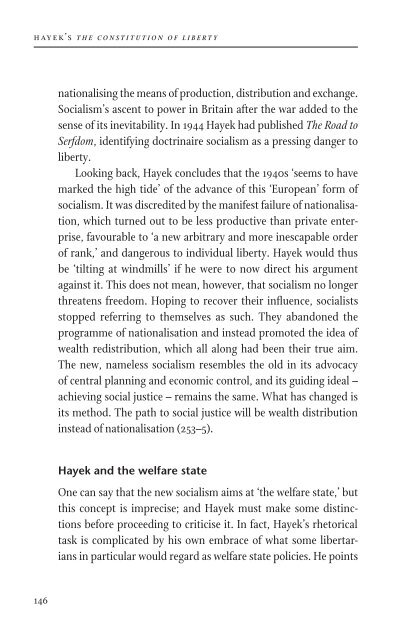Hayek's The Constitution of Liberty - Institute of Economic Affairs
Hayek's The Constitution of Liberty - Institute of Economic Affairs
Hayek's The Constitution of Liberty - Institute of Economic Affairs
You also want an ePaper? Increase the reach of your titles
YUMPU automatically turns print PDFs into web optimized ePapers that Google loves.
h ay e k ’ s t h e c o n s t i t u t i o n o f l i b e r t y<br />
s o c i a l i s m i n a n e w g u i s e : s o c i a l j u s t i c e a n d t h e w e l f a r e s tat e<br />
nationalising the means <strong>of</strong> production, distribution and exchange.<br />
Socialism’s ascent to power in Britain after the war added to the<br />
sense <strong>of</strong> its inevitability. In 1944 Hayek had published <strong>The</strong> Road to<br />
Serfdom, identifying doctrinaire socialism as a pressing danger to<br />
liberty.<br />
Looking back, Hayek concludes that the 1940s ‘seems to have<br />
marked the high tide’ <strong>of</strong> the advance <strong>of</strong> this ‘European’ form <strong>of</strong><br />
socialism. It was discredited by the manifest failure <strong>of</strong> nationalisation,<br />
which turned out to be less productive than private enterprise,<br />
favourable to ‘a new arbitrary and more inescapable order<br />
<strong>of</strong> rank,’ and dangerous to individual liberty. Hayek would thus<br />
be ‘tilting at windmills’ if he were to now direct his argument<br />
against it. This does not mean, however, that socialism no longer<br />
threatens freedom. Hoping to recover their influence, socialists<br />
stopped referring to themselves as such. <strong>The</strong>y abandoned the<br />
programme <strong>of</strong> nationalisation and instead promoted the idea <strong>of</strong><br />
wealth redistribution, which all along had been their true aim.<br />
<strong>The</strong> new, nameless socialism resembles the old in its advocacy<br />
<strong>of</strong> central planning and economic control, and its guiding ideal –<br />
achieving social justice – remains the same. What has changed is<br />
its method. <strong>The</strong> path to social justice will be wealth distribution<br />
instead <strong>of</strong> nationalisation (253–5).<br />
Hayek and the welfare state<br />
One can say that the new socialism aims at ‘the welfare state,’ but<br />
this concept is imprecise; and Hayek must make some distinctions<br />
before proceeding to criticise it. In fact, Hayek’s rhetorical<br />
task is complicated by his own embrace <strong>of</strong> what some libertarians<br />
in particular would regard as welfare state policies. He points<br />
out once more, as in Part II, that the Rule <strong>of</strong> Law limits only the<br />
coercive measures <strong>of</strong> government, leaving ‘a wide field’ for its noncoercive<br />
or pure service activities, which will clearly need to be<br />
financed through taxation (257–8).<br />
How then does Hayek’s position differ from the socialists’<br />
understanding <strong>of</strong> the welfare state? Hayek explains this difference<br />
partly by contrasting two conceptions <strong>of</strong> security, one <strong>of</strong><br />
which (the socialist conception) is at odds with individual liberty.<br />
Hayek thinks it proper that government should try to reduce risks<br />
common to all, help people provide against them, and assure ‘a<br />
given minimum <strong>of</strong> sustenance for all;’ but it must not attempt to<br />
secure to individuals the income that they are thought to deserve<br />
in comparison with other persons. Such a conception <strong>of</strong> security<br />
leads inevitably to arbitrary and coercive measures, since it<br />
wants to use government’s administrative powers to ensure that<br />
par ticular people get the particular things that they supposedly<br />
deserve. As the epigraph to Part III, Hayek uses a passage from<br />
Tocqueville 1 to illustrate how a society that seeks security through<br />
increasing dependence on the state can drift into despotism and<br />
end up losing its liberty (258–62, 251).<br />
1 ‘Above this race <strong>of</strong> men stands an immense and tutelary power, which takes upon<br />
itself alone to secure their gratifications and to watch over their fate. That power<br />
is absolute, minute, regular, provident, and mild. It would be like the authority<br />
<strong>of</strong> a parent if, like that authority, its object was to prepare men for manhood; but<br />
it seeks, on the contrary, to keep them in perpetual childhood: it is well content<br />
that the people should rejoice, provided they think <strong>of</strong> nothing but rejoicing. For<br />
their happiness such a government willingly labors, but it chooses to be the sole<br />
agent and the only arbiter <strong>of</strong> that happiness; it provides for their security, foresees<br />
and supplies their necessities, facilitates their pleasures, manages their principal<br />
concerns, directs their industry, regulates the descent <strong>of</strong> property, and subdivides<br />
their inheritances; what remains, but to spare them all care <strong>of</strong> thinking and all<br />
the trouble <strong>of</strong> living?’ Alexis de Tocqueville, Democracy in America, trans. Henry<br />
Reeve, edited by Phillips Bradley (New York: Alfred A. Knopf, 1945): v. II, 318.<br />
146<br />
147












